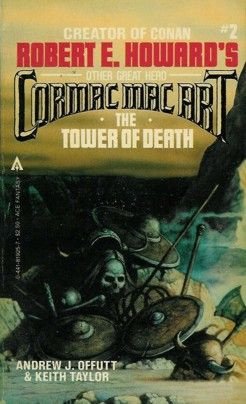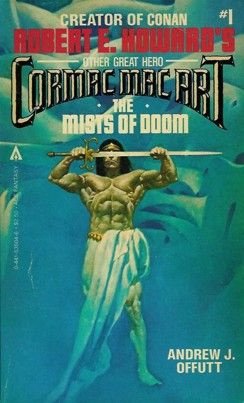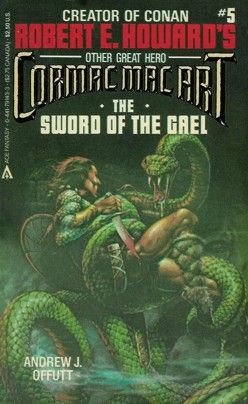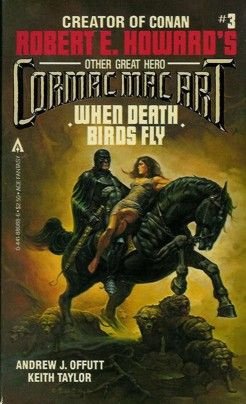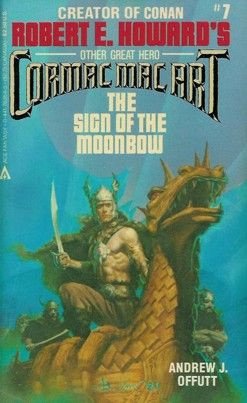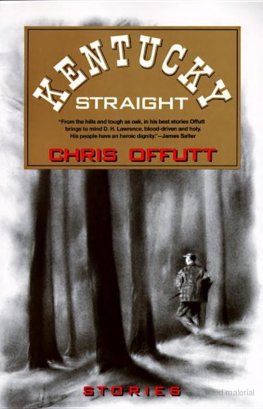Andrew Offutt - The Tower of Death
Here you can read online Andrew Offutt - The Tower of Death full text of the book (entire story) in english for free. Download pdf and epub, get meaning, cover and reviews about this ebook. genre: Romance novel. Description of the work, (preface) as well as reviews are available. Best literature library LitArk.com created for fans of good reading and offers a wide selection of genres:
Romance novel
Science fiction
Adventure
Detective
Science
History
Home and family
Prose
Art
Politics
Computer
Non-fiction
Religion
Business
Children
Humor
Choose a favorite category and find really read worthwhile books. Enjoy immersion in the world of imagination, feel the emotions of the characters or learn something new for yourself, make an fascinating discovery.
- Book:The Tower of Death
- Author:
- Genre:
- Rating:5 / 5
- Favourites:Add to favourites
- Your mark:
- 100
- 1
- 2
- 3
- 4
- 5
The Tower of Death: summary, description and annotation
We offer to read an annotation, description, summary or preface (depends on what the author of the book "The Tower of Death" wrote himself). If you haven't found the necessary information about the book — write in the comments, we will try to find it.
The Tower of Death — read online for free the complete book (whole text) full work
Below is the text of the book, divided by pages. System saving the place of the last page read, allows you to conveniently read the book "The Tower of Death" online for free, without having to search again every time where you left off. Put a bookmark, and you can go to the page where you finished reading at any time.
Font size:
Interval:
Bookmark:
Andrew J. Offutt
The Tower of Death
Keith Taylor
Introduction:
The Cormac Mac Art Cycle
Robert E. Howard began the recounting of the fifth century Irish heros exploits in Tigers of the Sea, which Ace has reprinted. They and the keeper of the REH papers and the Howard literary agent then asked me to continue the cycle (none of which was printed during Howards lifetime).
My first three novels followed Tigers chronologically. The fourth went back to recount the treachery-born events that led to Cormacs becoming outlaw, then exile from Erin. Later forced also to flee Alba/Caledonia/Scotland, he bitterly took to the sea as a reiver or reaver: pirate. He met the giant Wulfhere the Dane in prison. Later still Cormac became the only Gael aboard Raven, a Wulfhere-commanded ship crewed by Danes. Some of their exploits formed the four stories in Howards Tigers.
This is the fifth of the novels I have written, but the second in chronological order. It precedes Tigers by a few years. Herein the mac Art is younger-indeed, he lies about his age because of that embarrassment of youth we have all experienced. An exile, he has not forgotten her he left behind: Samaire. He loved her as he loved their mutual land: Erin or Eirrin.
He is a grim and sombre fellow. He is to become less so only in later years, when he re-meets Samaire and gains purpose and goal-and Irish shores. With Keith Taylor, this chronicle returns to that Cormac of less optimism and more dourness, and a different part of the world. Cormac is the exiled pirate among foreigners, crafty and untrusting.
Howard clearly indicated that mac Arts activities were hardly confined to the area of the British Isles. Rome had withdrawn from Britannia after four centuries of interference and domination. Britons were dying to invading Saxons and Jutes and Angles who would give the land its new name: Angle-land or Angle-terre: England. (Strangely, some Britons had fled from the continent whence came the conquerors. There they founded lesser Britain-Brittany-and clung to it.)
On that continent, the legacy of Romes pomp and paraphernalia of governance were more evident. The land was already in division among many lords. Soon there would be a king in Italy! Though Frank-land, France, did not exist, the Franks were on the rise with their terrible throwing-axes so like a pre-charge artillery barrage. The Roman title comes remained. It would become the French comte, which we call count. And though no Count has ever held demesne in my Kentucky, this state is divided into 120 count-ies.
A new age was aborning, in Europe. With the importation of the concept of stirrups, the age of chivalry-cheval-ry or horse-ry-would grow out of the chaos left by Romes fall, and endure until some fool went and invented gunpowder. (Surely not Hank, protagonist of Mark Twains sf-hf novel!)
In the A.D. 480s, Cormac and Wulfhere were raiding along the coast of what would become France, and soon they had to cross the treacherous Bay of Biscay to northwestern Spain-and honest employment!
Keith Taylor knows about twice as much about that area at that time as Andrew Offutt. Thats why he is needed as cohort in this novel and its direct sequel, When Death Birds Fly, and the others we have outlined, leading all the way to Wulfheres homeland, Danemark. Without Keith Taylor, this novel would be about half as good.
We have never met. We live precisely halfway around this planet from each other. Yet there are few lines in this book that are pure Taylor or pure Offutt. When we collaborate, we collaborate. (How? Expensively, between here and Australia!)
Sir Keith has worked out and sent over a fascinating astrological compilation for both Cormac and Wulfhere. Maybe it is pure imagination and maybe it isnt. What do you think their signs are? (Well actually, no, I didnt say that we are believers-or that we are not.)
The zodiacal signs of these two troublesome seawolves are of no concern to Emperor Zeno over in Constantin-opolis, or to his comes of Burdigala, the Count of Bordeaux. The Dane and the Irisher have been raiding all too successfully, and are about to be in big trouble.
Andrew Offutt
Kentucky, U.S.A.
PROLOGUE
Dye command war-galleys or wash-tubs? And are they fighting men at your orders-or babes messing their swaddling linen?
Harshly the demand was snapped out, and harsh was the mood of the speaker. Count Guntram of Burdigala* had lately come in for scathing rebuke on the grounds that hed let his masters law be flouted. Not a man to suffer in silence was milord Count, or to deny his underlings their just share of the kings anger. In truth he had just vented but a tiny measure of his frustration on the stolid officer before him.
*Bordeaux
Athanagild Berics son looked back at the count levelly. My men are warriors, by God! As for the ships- Athanagild shrugged and the movement brought a twinkling flash from the silver-gilt brooch that pinned his long green cloak to his shoulder. My lord has inspected them himself. There are not enough, and they are old, and no others abuilding. You said it yourself, so dont tell me Im scrabbling for excuses.
Guntram scowled and his face worked, but he told the officer no such thing. The man was right. Rome was a dying Colossus and the world it had created was coming apart all around the deathbed.
The count turned, still scowling, to stare out the unshuttered window at the courtyard of his mansion. The softly playing fountain, the colonnaded walk, the tiled roofs; all boasted silently of Roman architecture, and at least a hundred years old. The fountain leaped and shimmered prettily-and if it stopped Guntram of Burdigala knew it would hardly be worthwhile trying to have it repaired. The matter of warships was comparable.
But no, he mused, not quite; the matter of constructing and repairing warships was not quite the same.
Proculus, head of the municipal curia (who had brought two shrewd members of that body with him) coughed. Guntram turned slowly back, wearing a sour and challenging expression.
My lord Comes, Proculus said primly, it is not that shipwrights cannot be had. There are enough and to spare, it would seem, to knock merchant vessels together. He stressed the one word with distaste, while blandly ignoring the men of commerce also present in the chamber. Fashioning warcraft, no doubt, is a different matter, and the men able to do it fewer-
And most of them, Athanagild put in, for he commanded the royal fleet based in the Garonne, would liefer work for shares in pirate loot.
The comes or count banged a sword-strengthened fist on his oaken table. Objects jumped, and so did his secretary, who was sorely needed since my lord Count could neither read nor write. The count did not notice how hed disrupted the poor man-or paid no mind, at any rate.
Pirates! he roared. By the heart of Arius, Ive gone through reports of pirates all morning until Im fairly sickened. That shipping isnt safe is ill enow. That these northern thieves have dared pillage ashore is enough to make me-me, a man who followed king Euric into battle after battle-wish for Judgment Day!
Their numbers alone make them difficult to destroy as rats, my lord. The smooth, rather soft voice came from Philip the Syrian, a swarthy man and pockmarked. He blinked heavy eyelids. The noble Commander Athanagild must cope with Breton corsairs, Saxons and Jutes out of Britain-King Hengist notable among them-aye, and their cousins settled in the Charente, upon his very doorstep as it were-
And the Frisians, Count Guntram snarled,
Font size:
Interval:
Bookmark:
Similar books «The Tower of Death»
Look at similar books to The Tower of Death. We have selected literature similar in name and meaning in the hope of providing readers with more options to find new, interesting, not yet read works.
Discussion, reviews of the book The Tower of Death and just readers' own opinions. Leave your comments, write what you think about the work, its meaning or the main characters. Specify what exactly you liked and what you didn't like, and why you think so.

